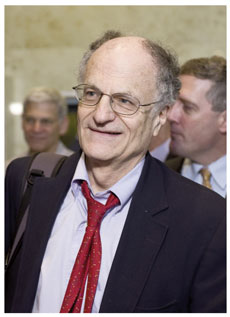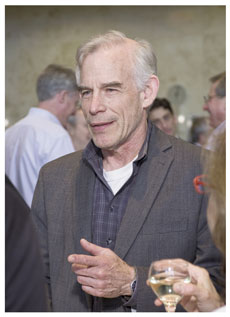Last October’s economics Nobel Prize announcement was greeted with much joy—but no surprise—at the Minneapolis Fed. After all, the two laureates, Thomas Sargent and Christopher Sims, had long affiliations with the Research department at the bank as well as with the economics department at the University of Minnesota. And they were instrumental in forging a partnership between the two institutions during the 1970s that saw the development of major breakthroughs in economic thought and continues to produce cutting-edge research to this day.

Thomas Sargent
So it was natural that the Minneapolis Fed should host a conference in honor of the two scholars. Economists from all over the world who studied with or were influenced by Sargent and Sims came to the bank on May 4 and 5 to pay tribute to them and to present research that follows their enduring legacy.
Both men have produced an extensive range of contributions to many areas of economics—macroeconomics, econometrics, financial economics, and monetary theory and policy analysis, for example. But the thread that binds this work is devotion to development of mathematical models and empirical methods (with an important role for expectations) in order to rigorously investigate how economic “shocks,” as well as policy changes, influence the macroeconomy.
Consistent with this breadth, the research presented at the conference spanned a variety of topics. For example, New York University’s Giovanni Violante kicked off the second day, presenting joint research with the Minneapolis Fed’s Jonathan Heathcote and Kjetil Storesletten about how workers’ ability to insure against risks to their earnings relates to the recent rise in inequality in the United States. The clever innovation in their paper involves fitting the model to data to measure how insurance has changed over time.

Christopher Sims
Not surprising, in light of the recent financial crisis, many papers were on financial topics or on the intersection of macroeconomics and finance. Others covered topics in public finance, business cycles and information economics. (Papers and presentations can be found online here.)
But the conference wasn’t all serious research. Participants shared stories, some heartwarming and some humorous, about studying and working with Sargent and Sims. These included dinner remarks by Minneapolis Fed President Narayana Kocherlakota.
And then there were the skits, in which conference organizers gently lampooned Sargent’s and Sims’ personalities. One highlight was a reenactment of a collaboration by the two, played by Heathcote and Cristina Arellano, in which Nobel laureates Edward Prescott and Robert Lucas, playing themselves, walked through and mocked them. “What is all this mumbo-jumbo engineering gobbledygook?” Prescott asked. “I don’t know,” Lucas responded, “but we’d better not get involved.”
When a research conference is held in someone’s honor, the honoree doesn’t usually present his or her own work. But in this case, each day of the conference finished with one laureate presenting new research of his own: Sargent’s paper looked at optimal taxation policies when consumers can’t perfectly smooth out shocks to their incomes and taxes are used for redistribution; Sims presented a model to explain how prices often make big jumps, rather than adjusting smoothly. The papers were highly technical, cutting-edge research on fundamental problems in economics and testament to their authors’ sustained drive, engagement and brilliance. During these presentations, Sargent and Sims each, characteristically, offered insightful critiques of the other’s paper; such parries and counterparries occurred throughout the conference. Indeed, this sharp, constructive interplay made evident why the Nobel Committee awarded the much-deserved 2011 prize to them jointly.
Joe Mahon is a Minneapolis Fed regional outreach director. Joe’s primary responsibilities involve tracking several sectors of the Ninth District economy, including agriculture, manufacturing, energy, and mining.



